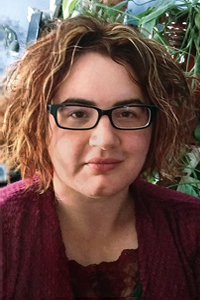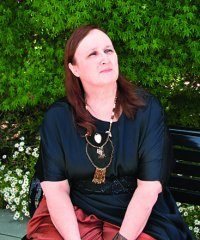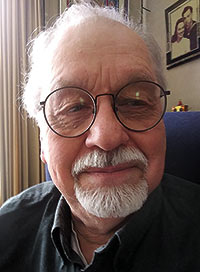Lauren Beukes: Shining Girl

Lauren-Ann Beukes was born June 5, 1976 and grew up in Johannesburg, South Africa. She earned a MA in creative writing from the University of Cape Town, and spent a decade as a freelance journalist working in South Africa and the US. She has also worked as a writer and developer for children’s television.
She began publishing short fiction in 2004. Her debut novel Moxyland appeared in 2008, and was followed by Arthur C. Clarke Award winner Zoo City (2010), also a finalist for the World Fantasy and Crawford Awards. The Shining Girls (2013) won the August Derleth Award for Best Horror Novel, the prestigious literary University of Johannesburg Prize, and the Strand Critic’s Choice Award for Best Mystery Novel. Her newest novel is Broken Monsters (2014). She also wrote non-fiction book Maverick: Extraordinary Women from South Africa’s Past (2005) and has written comics and short fiction. She was a finalist for the Campbell Award for Best New Writer in 2011.
Beukes lives in Cape Town, South Africa with her family.
‘‘My parents were always very liberal. They weren’t part of the anti-apartheid struggle, but they were involved in their church in housing and feeding programs. I grew up with the fundamental understanding, which a lot of white South Africans didn’t have, that black people are people, too. I went to a private school, which meant there were black kids in my class. Government schools were completely segregated. It was a very strange time. We had ruthless censorship of the media. All the news stories you guys saw about apartheid were not what we saw. We were sheltered from the terrible things our government was doing. There were so many ridiculous things. For example, the South African apartheid government banned the book Black Beauty. Not because they had anything against horses, but because the words ‘black’ and ‘beauty’ can’t possibly fit together. It’s crazy – these dictatorial states that are just laughably bad.”
…
‘‘Both Moxyland and Zoo City are apartheid allegories. Moxyland is a neo-cooperate apartheid. I was looking at how this terrible system might come into play again when, supposedly, we’ve learned better, and at how we’re controlled by our cell phones and convenience. With Zoo City, it’s looking at crime and how we talk about crime and criminals. It’s every South African dinner party conversation, which inevitably turns into: ‘My friend’s place was broken into. My car was hijacked.’ It’s very painful, but it’s also very banal. We lose sight of what it means, and why people are committing crimes in the first place. I was also very interested in reconciliation. The Big Crocodile president died around the time I started working on the novel. He was a terrible man. He authorized third party violence to create political unrest and tried to tip the country into civil war with secret, CIA-level dealings, giving guns to one group and telling them to attack another to make it look like ‘those black people’ were out of control. He authorized the assassination hit squads and the torture camps and everything else. So he was a terrible man. He died, living in his swanky retirement village up the coast – and the ANC government threw him a state funeral. I couldn’t believe it. I was horrified. I was like, ‘This man is responsible for your friends’ deaths, for any number of atrocities.’ They flew the flags at half mast above parliament. I thought, ‘This is insane, this is disgusting.’ Then I realized that it’s actually a gesture of incredible grace and reconciliation, to extend that level of honour to a man who doesn’t deserve it. I thought, ‘What’s wrong with me, that I can’t forgive and offer that gesture of reconciliation?’ That’s what Zoo City was trying to work out: how do you forgive, and can you reconcile?”
…
‘‘The Shining Girls is set in Chicago, where I lived during 2000-2001. I moved to New York for love, and it was a complete disaster. I had friends in Chicago, so I went and stayed with them and did some journalism.
‘‘I wanted to write a book about a time-travelling serial killer, but I didn’t want to do Bill and Ted’s Excellent Killing Spree Through Time. I wanted to look at the 20th century and how it shaped us. In South Africa that would have been an apartheid story, and that’s all it could have been, because that’s so overwhelming. How do you talk about other stuff? You have to address it. So I decided to set it in Chicago. In South Africa we like to think we do corruption and crime and segregation best, but Chicago’s pretty good at those things. …
“I wanted to write about ordinary people and show they had a huge role to play in the world. None of the shining girls was going to be the next president of the United States, or stop the financial crash, but they made a difference in their contexts. I wanted a Red, I wanted an abortionist, I wanted a showgirl (just because showgirls are great). I wanted one of them to be transgender, to show what it was like to be trans in the 1940s and 1950s. I was very interested in Jim Crow laws. Segregation and justice is always a huge part of my work, coming from the South African perspective. …
“Actual serial killers are not diabolical Hannibal Lecters. They’re not super smart. Some of them can be charming and functional, but many of them are pathetic lonesome losers who feel powerless in the world. A lot of them have sexual impotence, but a lot of them just feel impotent in their lives. They don’t have any insight into what they do. If you hear interviews with serial killers in prison, they’re like, ‘I don’t know, I just felt like it. It got me off.’ There’s no deep meaning. Some of them were abused as kids. Some of them, something happened where they were broken inside – maybe they didn’t get enough food and that affected their brain development. We desperately want there to be a good reason for serial killers. We want their family to have been eaten by cannibals, and this, this is why they turned into diabolical monsters. But they’re not monsters, they’re just pathetic men; they’re vile opportunists.”
…
‘‘I’m always secretly writing about Johannesburg. The Detroit of Broken Monsters is really Hillbrow MI. Chicago in The Shining Girls is really Johannesburg IL. But these things are universal. Hillbrow as a neighbourhood is held up as an example of everything wrong with South Africa: the poverty and boarded-up buildings and refugees and crime. People say the same things about Detroit. It is a symbol of ‘‘everything wrong with this country’’. People still live there, though – they’re still mowing their lawns and raising their kids, and that’s what I wanted to get at. Detroit is this incredibly evocative city, and it is this terrible symbol. You go and there are abandoned lots with one house standing, and there are feral dogs, and broken-down factories, and junk. It’s evocative because it’s the ruins of our civilization. It’s not the Acropolis – it’s us.”





